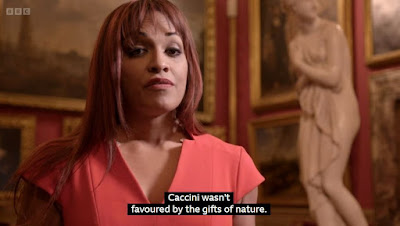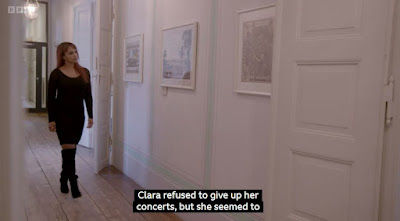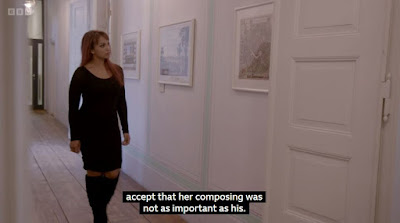Dear Reader, do you sometimes feel occasional aching even when you're just lying in bed trying not to wake up your spouse or partner?
I know Lois and I do! But then we are 77, so fair enough: after all we were alive and walking about and chattering amiably and non-stop as long ago as 1948, 75 years ago, when most of people around today weren't even "thought of", or, if they're a bit older than that, maybe they were just a gleam in somebody's eye. I'm not sure - perhaps I should be told - you do the leg-work, will you: thanks !!
Well, we find out today that even people as young as 63 can have these aching feelings in bed. We make this discovery because we're starting the day off on the sofa with a "Danish" - no, not a pastry, it's the reading of a page of a Danish whodunnit crime story, "Judaskysset" (The Judas Kiss), by Danish author Anna Grue.
Lois and I are the leaders of the local U3A Intermediate Danish group, and our meetings are going to start up again next week after an extended summer break. Most of our members are female seniors, so Lois and I feel that they're bound to get very excited when they start reading the book - the story starts off in the bed of a 63-year-old menopausal visual arts teacher, Ursula, who's managed to catch the eye of a muscular 29-year-old paint-maker, Jakob.
"What's not to like!", we feel that most of the female group-members' reaction will be. But at the same time, the account of their relationship is nothing if not realistic - and it brings up a few home truths about the downside of older-woman younger-man relationships.
Ursula is lying there in bed, and looking at the taut body and powerful muscles of the sleeping Jakob, 34 years her junior, and thinking how much she cringes whenever she sees her own "flabby tummy fat" against his hard abdomen - oh dear!
She's totally infatuated with Jakob - it's been 5 months 3 weeks and one day since she first got to know him, and she never stops thinking about him. He's never out of her thoughts, no matter what she's doing: teaching, watching TV, eating, drinking, even when she's going to the toilet - yikes!
She's mentally gobbled him up, the book says. Her body has taken him in, and become one with his, and not just when they're having sex, but all the time. He's got himself truly inside of her, a part of her. Yikes (again) !!!!
Even the menopause is helping Ursula to some extent because her hot flushes keep her warm when Jakob turns over and takes the duvet with him.
At the same time, the writer doesn't pretend that there aren't downsides to the affair for Ursula - and backache is the number one. Oh dear - I hope Jakob hasn't been trying anything too athletic with her. That would be madness at her age haha!!!
Don't be too ambitious, Jakob okay haha!!!!
Poor Ursula !!!!!!!
11:00 This week we're mostly trying to sort our lives out, as you know, and solve some of the mass of unresolved issues still dogging us since we left Cheltenham 11 months ago, after 50 years there, and downsized into our current new-build home here in Malvern.
Today, we're going to be mostly sorting our our savings, and also trying to find out from the doctor how my hip is getting on - I had an x-ray 10 days ago. And for now, we're putting aside the fact that we haven't got a shed yet and that we need a new spare bed: those will go into the "too-difficult box" for the moment [You surprise me! - Ed].
I successfully open a new savings account online this morning, but I don't manage to find anything out about my hip - I've got to ring the doctor again tomorrow. However, I do get a useful automatic message when I first get through to the surgery on the phone: the voice tells me that they are going to be scheduling COVID booster jabs for October.
A lot of the surgery's old-codger patients have obviously been complaining that we didn't get a COVID booster when we got our winter flu jabs last weekend, but the automatic message says they'd already arranged the flu jab sessions and that these had to go ahead without the COVID boosters, which weren't yet available. However, it's nice to know they're on the way, isn't it.
20:00 Lois and I wind down on the couch tonight with an interesting documentary, presented by operatic soprano Danielle de Niese, all about women composers through the ages - how they often got ignored or despised, and how, even if they achieved some degree of fame in their lifetime, they tended to get forgotten about when they're dead.
If you were a woman composer, you had to overcome all sorts of obstacles that didn't really trouble the male composers. The Florentine composer of both vocal and theatrical works, Francesca Caccini (1551-1618), like all women of that era, had to be not just good at their professional work but also meet very strict guidelines for moral behaviour.
Caccini's own singing voice, according to a contemporary Christopher Bronzini, "had such stunning effects on her listeners, that it changed them from what they had been". A great compliment, but also a potentially dangerous one in those crazy, far-off times, because the courtesans of Florence, for example, were notorious for the kind of singing that "lured men into sin".






































No comments:
Post a Comment